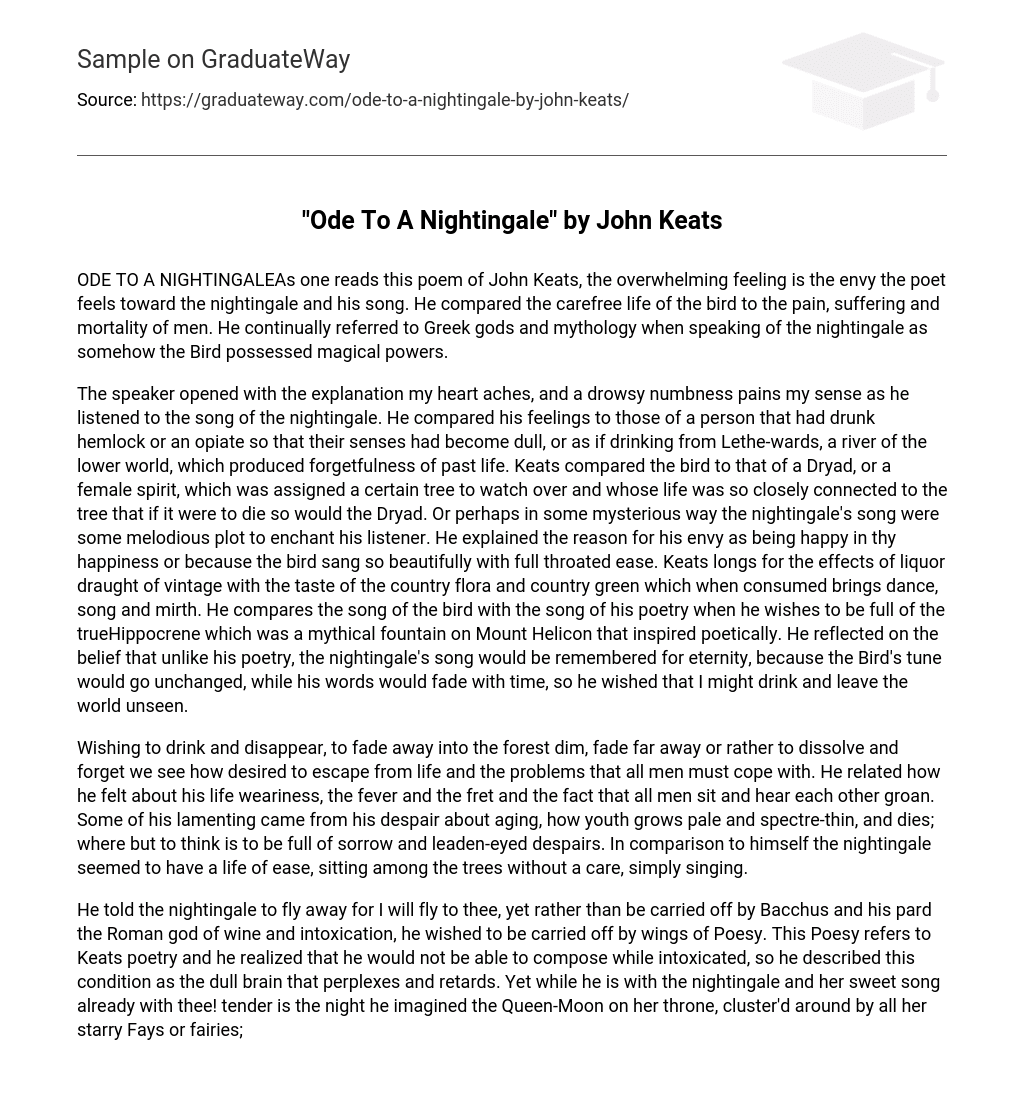ODE TO A NIGHTINGALE
When reading John Keats’ poem, one cannot help but notice the intense envy he harbors towards the nightingale and its melodic song. The poet juxtaposes the carefree existence of the bird with the agony, hardship, and eventual death faced by humanity. Throughout the poem, he frequently alludes to Greek gods and mythology, portraying the nightingale as possessing mystical abilities.
The speaker began by expressing the distress that fills his heart and the numbing pain that clouds his senses as he listens to the nightingale’s song. He likened his emotions to those of someone who has consumed hemlock or an opiate, which dulls their senses, or as if they had drunk from Lethe-wards, a river in the underworld that brings forgetfulness of past life. Keats compared the bird to a Dryad, a female spirit assigned to protect a specific tree, implying that the nightingale’s life is intricately intertwined with the tree’s, so their fates are linked. Alternatively, he entertained the idea that the bird’s song could be an enchanting plot aimed at captivating its listener. The reason for Keats’ envy lies in the joy he finds in the bird’s happiness and its beautifully sung melodies. He yearns for the effects of an alcoholic beverage made from country flowers and herbs, which when consumed brings forth dancing, singing, and merriment. Keats compares the bird’s song to his poetry when he desires to be filled with true inspiration from Hippocrene, a mythical fountain on Mount Helicon known for inspiring poets. He reflected on the belief that unlike his poetry, the nightingale’s song will be remembered for eternity, as it remains unaffected by time while his words will fade away. Thus, he expressed a desire to drink and depart from the world unnoticed.
Desiring to drink and vanish, to blend into the dim forest, to fade away or dissolve and forget, we observe the wish to escape from life and the burdens that everyone must face. The narrator expresses his weariness with life, the restlessness, and the fact that all humans listen to each other’s groans. Part of his lamentation stems from his despair about growing older, how youth becomes pale and thin like a ghost, and eventually dies; where merely thinking leads to sorrow and heavy-eyed hopelessness. The nightingale, in comparison, seems to lead an effortless existence, perched among the trees without a care, simply singing.
He instructed the nightingale to fly away because he wanted to be carried away by the wings of Poesy instead of being influenced by Bacchus, the Roman god of wine and intoxication. He understood that he wouldn’t be able to create poetry while under the influence, so he described this state as a dull brain that perplexes and hinders. Nevertheless, while being with the nightingale and enjoying her beautiful song, he imagined a scene where the Queen-Moon sits on her throne surrounded by her starry fairies. It is believed that fairy dances can only be witnessed during a full moon, which symbolizes the nightingale’s enchanting power that guides him to a world of legends. In this dimly lit environment, he became more aware of his surroundings as he noticed the sweet scent emanating from the branches and detected the fragrances of various flowers and fruits, such as hawthorn, violets, and musk-rose filled with sweet wine. Amidst the darkness, he sat and listened to the haunting buzz of flies while contemplating his own mortality and confessing his partial attraction towards an easy death, a subject he had often explored in his contemplative poems.Keats initially believes that dying at this moment would be preferable in order to escape any potential pain. He finds the idea of dying without suffering during midnight more appealing compared to the nightingale’s soulful and ecstatic song. However, his perspective quickly changes upon realizing that the nightingale would continue to sing, possibly even a mournful requiem, while he would be deprived of hearing the music. In essence, he would have ears in vain.
He respected the nightingale as an eternal Bird, unaffected by anything happening around him. He believed that the bird’s song would remain unchanged forever, so he contemplated about the past and all the people who had listened to the same song. The voice he hears has been heard since ancient times by both kings and commoners. There is no distinction between the rich and the poor, the wise and the foolish, as they all enjoy the same song. He then refers to Ruth from the Bible, reflecting on her sad heart while living in a foreign land and possibly longing for home as she listens to the nightingale. At this moment, Keats no longer sees the bird’s song as one of joy, but rather one of sorrow or melancholy. He becomes introspective, losing his fixation on the nightingale. He bids farewell to the bird, calling it a deceptive elf. Perhaps he feels deceived by the song, thinking it brought happiness when it is truly a mournful anthem. As the nightingale flies away across nearby meadows, over a tranquil stream, and disappears into distant valley-glades, he wonders if it was merely a vision or a waking dream. Is he awake or asleep? Poetry and Poets.





